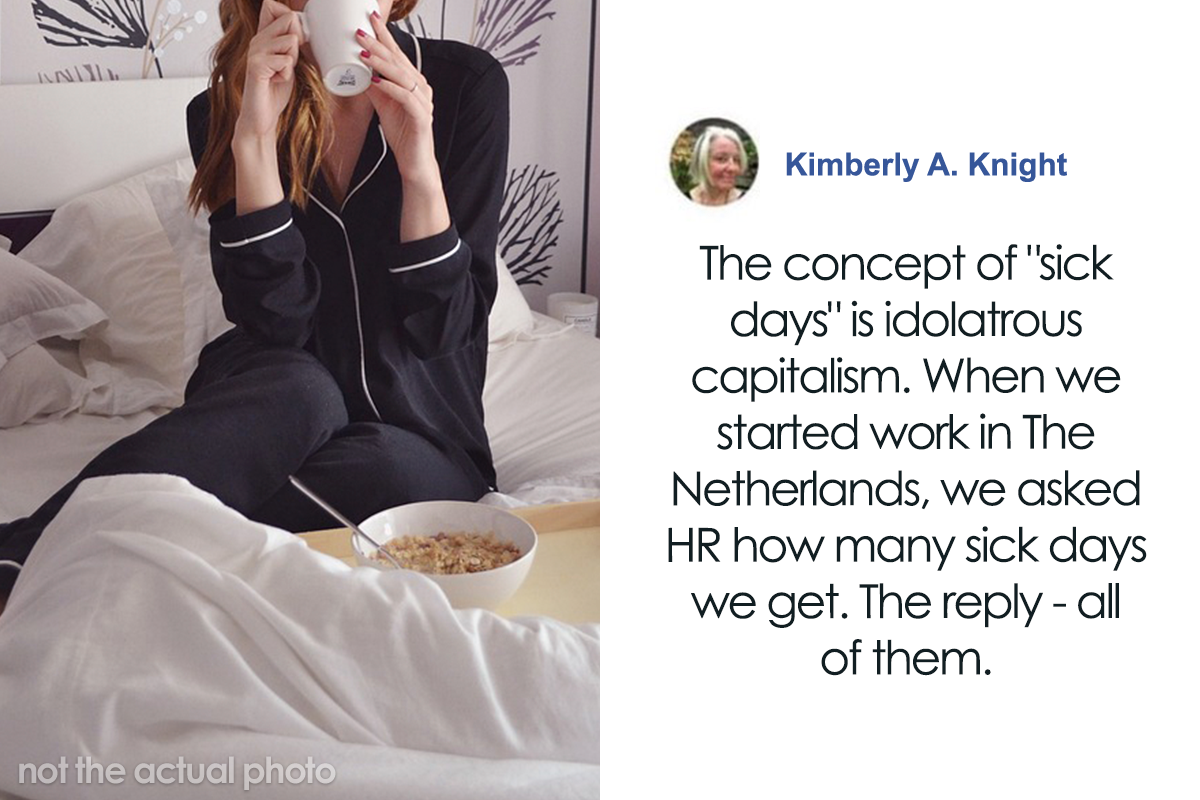
American Woman Discovers That The Netherlands Doesn’t Have The Concept Of “Sick Days” And Creates A Discussion Online
Interview With AuthorWhen you got sick at school, all you needed was for your parents to tell your teachers that you were not coming in and for your friends to tell you what was for homework that day. You didn’t feel too much stress unless you were missing a test.
When you grow up and get a job, you still get sick. For some, it is more stressful than others because in some countries, the social system supports sick people and they still get paid and get to rest, while in other systems, you risk getting fired if you are not feeling too well and can’t come to work.
More info: Reddit
Reddit user shared a Facebook post by an American living in the Netherlands about a culture shock, revealing how abusive the system in the US is
Getting fired for falling sick is nothing unheard of in the US. Not only do people have to pay ridiculous amounts of money for a visit to the doctor, but if their employer thinks them having a fever and not being able to come in to work is too much of an inconvenience, they will fire them.
It is because they have at-will employment, which means “that an employer can fire an employee for any reason (if it’s not illegal), or no reason, with no warning, and without having to establish just cause,” according to Better Team.
They add, “All states in the U.S., excluding Montana, are at-will. Most do have exceptions, but the states of Florida, Alabama, Louisiana, Georgia, Nebraska, Maine, New York, and Rhode Island do not allow any exceptions.”
In the states that exceptions are allowed, they include public sector employment, unionized jobs, if their contract says otherwise, if the employer is discriminating, refusing to do something illegal, etc.
The woman moved to the Netherlands six years ago with her wife and because they were planning to live there, the women found jobs
Image credits: Mojpe (no the actual image)
But it seems that this problem of being fired over a thing you can’t control is a US problem and Americans realize how wrong it is when they move to another country. A post of a woman on Facebook who moved to the Netherlands and asked HR how many “sick days” she’d have went viral on Reddit.
The author of the post is Kimberly A. Knight, who is interested in health and wellness and is a certified nature therapy guide as well as a Veriditas trained labyrinth guide, among other things that she took up in her life, allowing the path to unfold itself on its own.
Kimberly moved to the Netherlands six years ago with her wife as her wife got a job to teach at an international school. Naturally, she wanted to find out how things work at a workplace. And an important thing to discuss is the policy related to what to do when you get sick.
The woman was used to getting limited “sick days,” so she asked how many of them she’d get, and was met with a confused look as in the Netherlands, if you get sick, you don’t work until you get better.
They were trying to figure out how it all works there and one of the questions they had were how many “sick days” they would get
When Bored Panda got in touch with Kimberly, we found out that she herself has worked while sick when she was still living in the US, “Hours and hours of work sick so that it took weeks to fully recover from what might have taken only days if I had allowed my body to rest when sick – colds that turned into really bad bronchitis that now returns every year.”
Then she couldn’t allow herself not to work as she was a server and if she didn’t work, she didn’t get tips which meant she couldn’t even afford groceries.
Meanwhile she is now in the Netherlands, where servers get paid sick leave and must be paid at least minimum wage. On top of that, Kimberly is sick at the moment of writing herself and she was answering our questions from home resting to recover from her flu-like illness.
They were used to getting limited sick days if the employer was feeling generous and there weren’t a universal amount decided on a federal level
To introduce her American friends to the Dutch policy Kimberley provided a translation of their law: “If you own the company in the Netherlands and one of your employees becomes ill, you must go on paying them for a maximum of two years.”
This post had an intention to illuminate Americans that their way of doing things is not necessarily the best because Kimberly believes that not many Americans know that other countries protect workers’ rights. However, it is important to show them that, “I believe if more Americans know that other viable ways exist, they might organize and demand better from law-makers back home.”
The question was met with a confused look as in most countries around the world, including the Netherlands, you don’t plan in advance how long you will be sick
The hard part is that “some who do know, believe that it is either impossible because some Americans will take advantage of the system or, countries that provide universal health care and generous time off are embedded in political landscapes that Americans have been taught to fear and loathe. That lack of awareness is intentionally cultivated by industries and politicians who profit off of a misinformed, disempowered population.”
A lot of people in the comments of the post also immediately thought that this is a law that is just asking to be abused. Kimberly didn’t deny it, but she thinks that a good workplace and an understanding employee is what makes people be honest: “One reason some people might ‘abuse the system’ is that the system is toxic and broken. Workplace conditions matter. A lot. When people are paid well, treated fairly and culturally conditioned to respect work/life balance (their own and others’) it makes a big difference.”
Although, going back to the law, there is more nuance than just an employer paying their employees for two years. There is a page dedicated to business owners in the Netherlands all in English and it says: “You should pay: 70% of the employee’s normal wages during the first year of illness. If this amounts to less than the minimum wage, you should supplement it up to the minimum wage amount. 70% of the employee’s normal wages during the second year of illness. You do not need to supplement if the amount is less than the minimum wage. If your employee is off sick because of organ donation, pregnancy or giving birth, you need to pay 100% of their normal wages.”
They also provide information if an employer has older employees, disabled employees and if there are any other circumstances.
Most countries provide paid sick leave until the person gets better, but the pay may vary depending on the country
While employees get paid less when they are sick, people in the comments believed that was still fair as the person isn’t working and it is more than most American employees do for their sick employees.
It’s not only the Netherlands who protect sick employees. According to World Population Review, “Most nations within the European Union have the best sick pay benefits in the world. However, Japan, Canada and Australia make provisions for employees to receive 66%, 55%-80%, or 100% of their pay. The United States, by the way, is the only developed country that doesn’t offer any guaranteed sick days.” Many countries in South America, Asia and Africa provide their employees with paid sick leave as well.
That made Kimberly realize that the way the US handles it is created to make the people who are already rich richer
Kimberly calls the American view of “sick days” idolatrous capitalism and people in the comments weren’t surprised that the US doesn’t have federal laws for this and allows employers to do as they wish. And after living in the Netherlands for six years she can’t think of many things that the Dutch should learn from Americans, except for more spice in food, but there are more things the Dutch do better, in her opinion.
Among the things Kimberly mentioned was that she truly feels safe there, “the safety and freedom here just IS and not something about which people are waving flags, wearing slogans or covering their cars in bumper stickers.”
She was surprised that parents are given paid leave before and after a baby is born and are provided with additional care such as a nurse who “Checks the birth parent’s recovery daily. Checks the baby daily (weight, temperature etc.). Does basic housekeeping, such as doing the laundry and cleaning the bathroom. Guides nursing mothers, if necessary.”
Another thing the woman admires is that people will work only when it’s their official hours and won’t respond if it’s the weekend or later in the evening. She was also surprised to get paid for her holidays and actually contacted HR as Kimberly was convinced it was a mistake.
To people who were concerned about people abusing the system, Kimberly explained that when you have good work conditions, you won’t try to deceive anyone
It seems that the Dutch know how to take care of people living in their country and Kimberly enjoys living there very much, although homesickness is something you can’t avoid no matter how critical you are of your home as it is were family and friends live and in Kimberly’s case, she “deeply misses the wide open spaces and national parks and across the American landscape.”
Kimberly’s post started a pretty long thread and Americans shared their experiences of being fired or knowing someone who got let go because of being sick or being forced to work while sick. Others shared that they do have paid sick days and revealed what countries they were from.
We would like you to join the conversation as well, so leave your thoughts and reactions in the comments!
I’m CEO at a Swedish company. Yes it will cost the company some money when a coworker gets sick. But it’s a lot more expensive if they come to work and not only feel so bad that performance is lacking but also spread those lovely germs to the rest of the crew. Many workplaces will pay you back for the cost of getting a doctors note when needed.
I live in a "third world country" (Latin American country, go figure) and had a year and a half full pay sick leave when I got cancer. If you had a flu it's the same, you only need a note from your doctor
Still hilariously sad that Americans are so badly treated and still think they live in the best place ever. The USA like the most successful cult ever.
We don't think that at all. We envy snobs like you who say things like this. Our government is controlled by uber rich morons like trump! Stupid people vote against their own best interest because billions is spent by the wealthy politicians for false advertising.
Load More Replies...I’m CEO at a Swedish company. Yes it will cost the company some money when a coworker gets sick. But it’s a lot more expensive if they come to work and not only feel so bad that performance is lacking but also spread those lovely germs to the rest of the crew. Many workplaces will pay you back for the cost of getting a doctors note when needed.
I live in a "third world country" (Latin American country, go figure) and had a year and a half full pay sick leave when I got cancer. If you had a flu it's the same, you only need a note from your doctor
Still hilariously sad that Americans are so badly treated and still think they live in the best place ever. The USA like the most successful cult ever.
We don't think that at all. We envy snobs like you who say things like this. Our government is controlled by uber rich morons like trump! Stupid people vote against their own best interest because billions is spent by the wealthy politicians for false advertising.
Load More Replies...


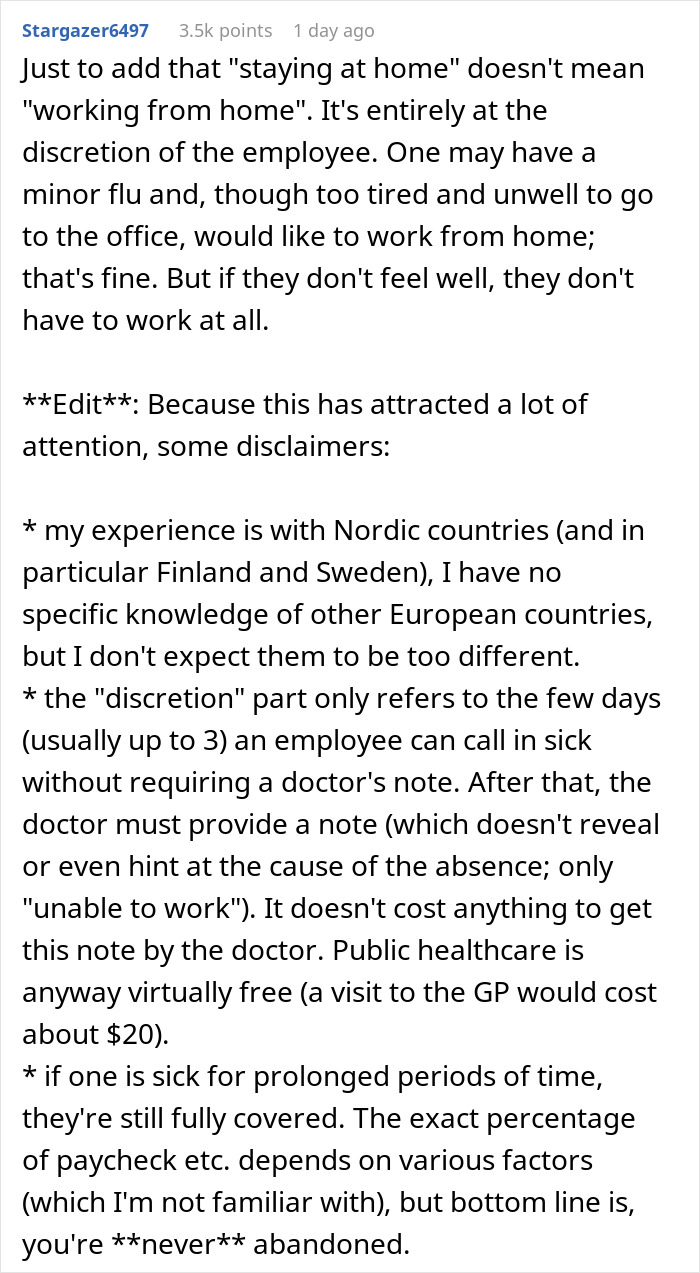

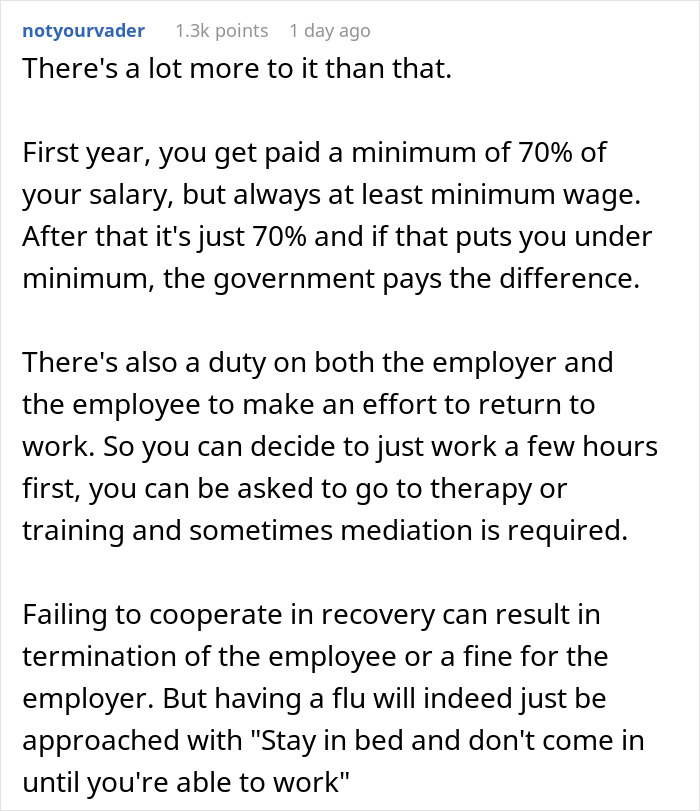
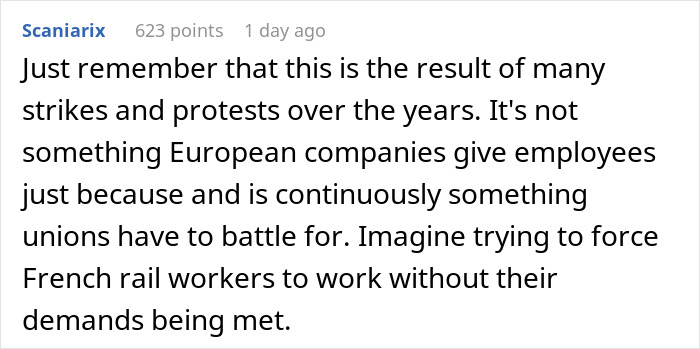


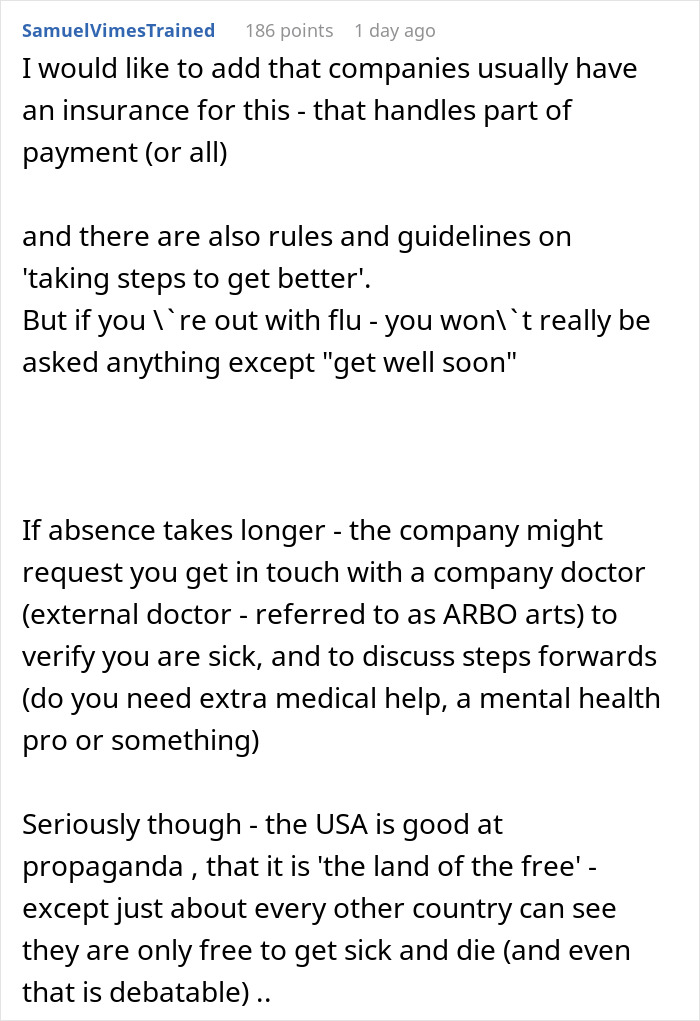
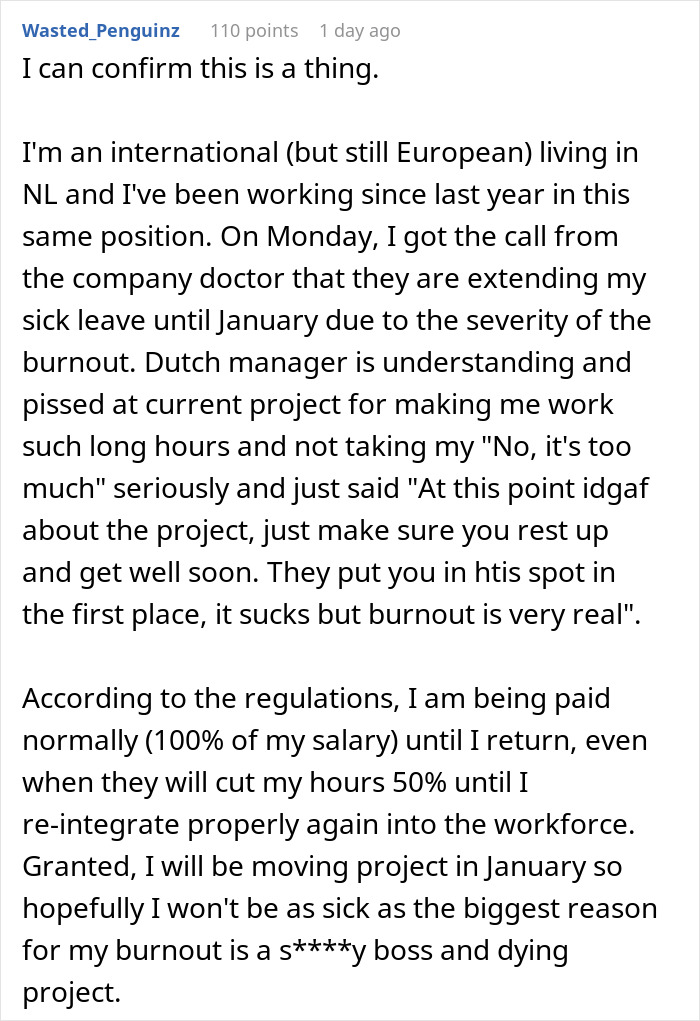
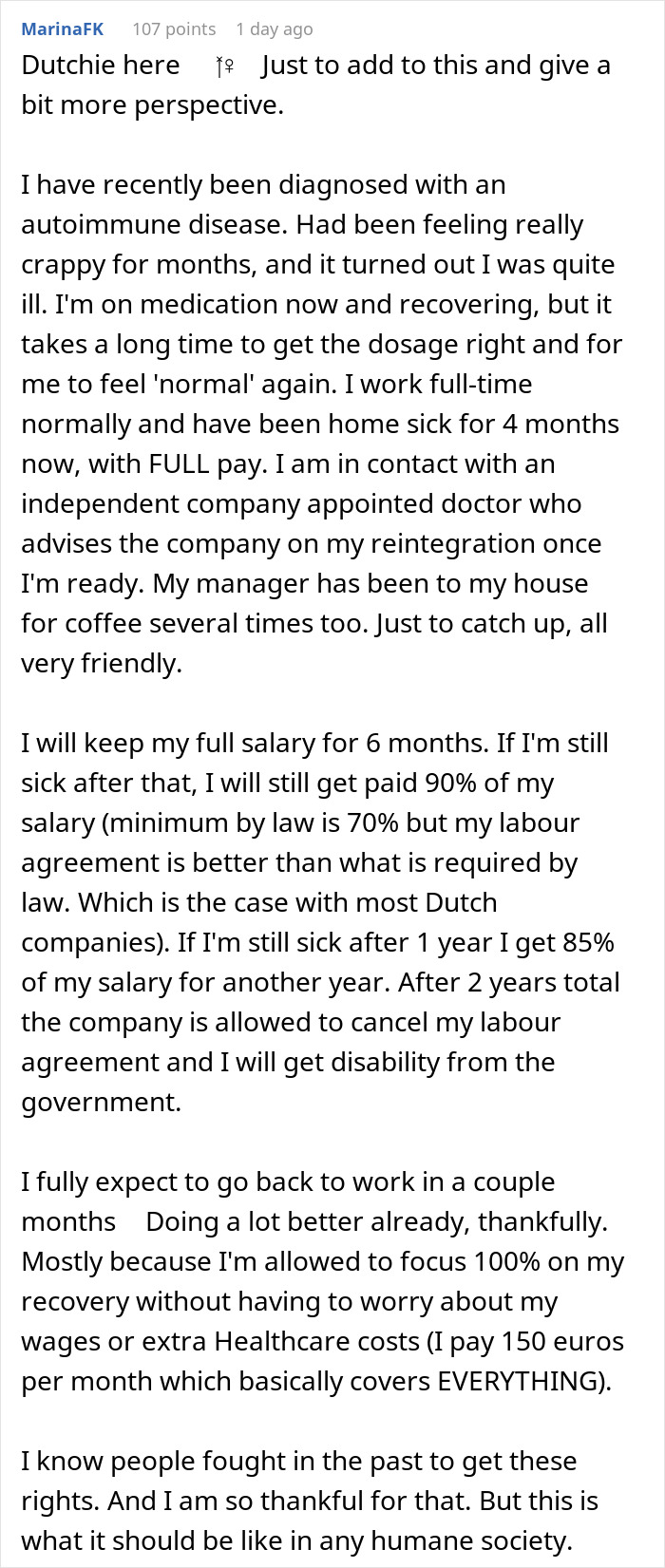
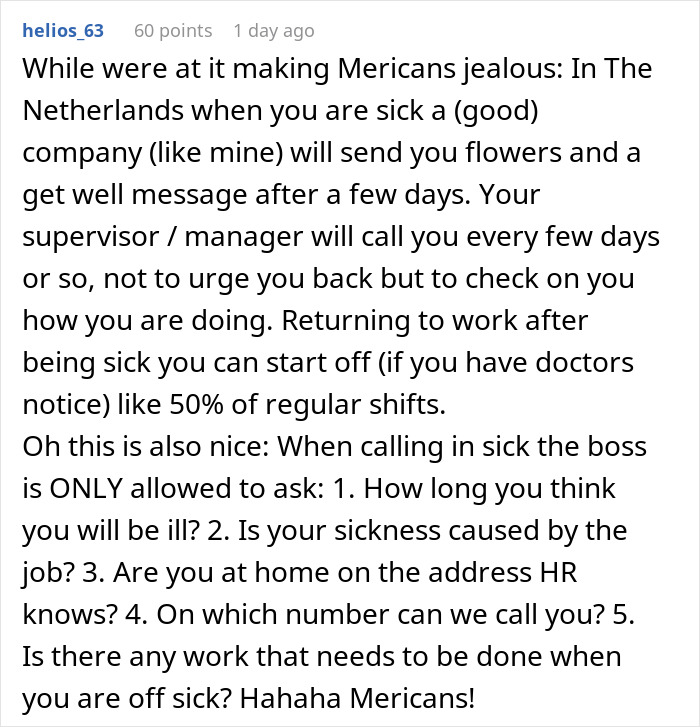

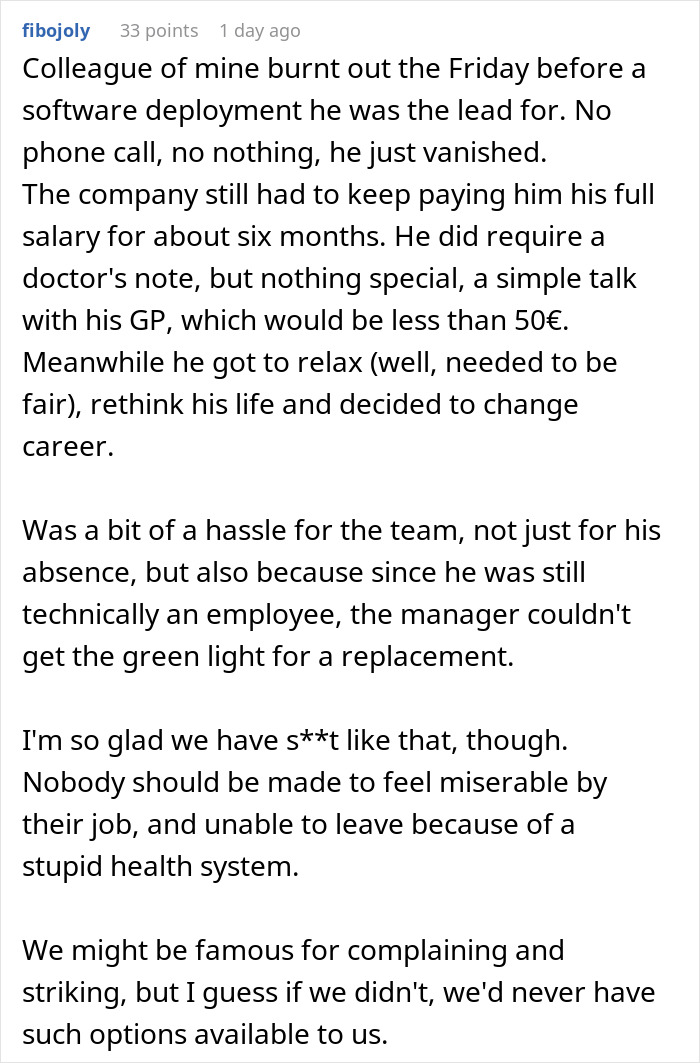
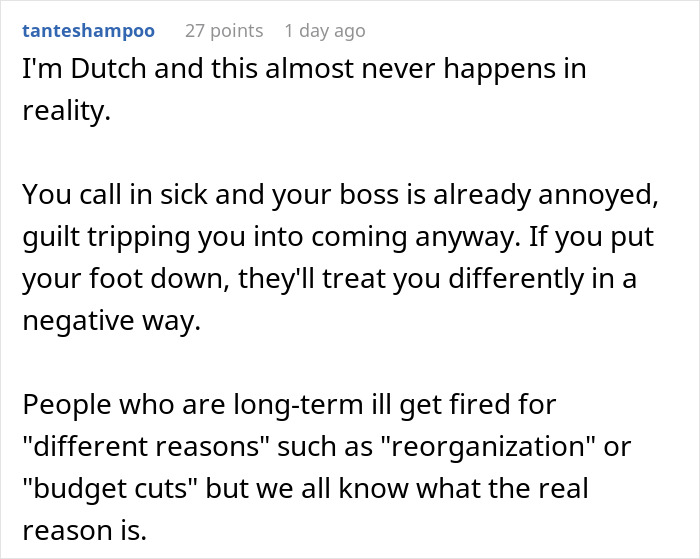
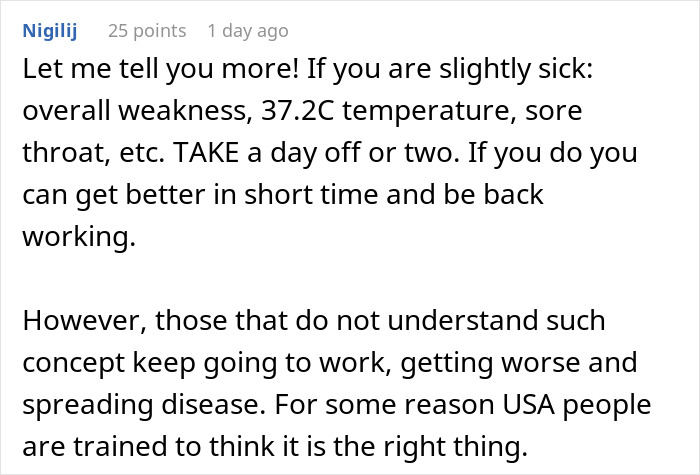
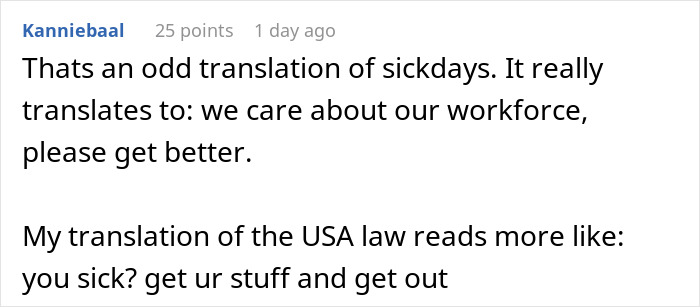
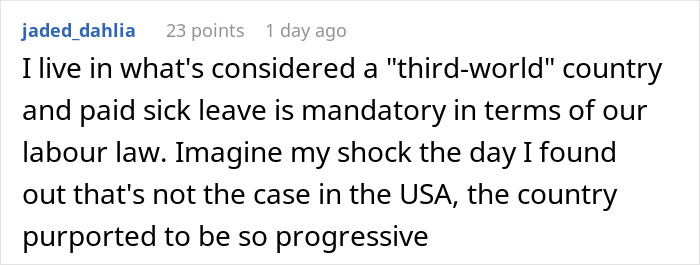
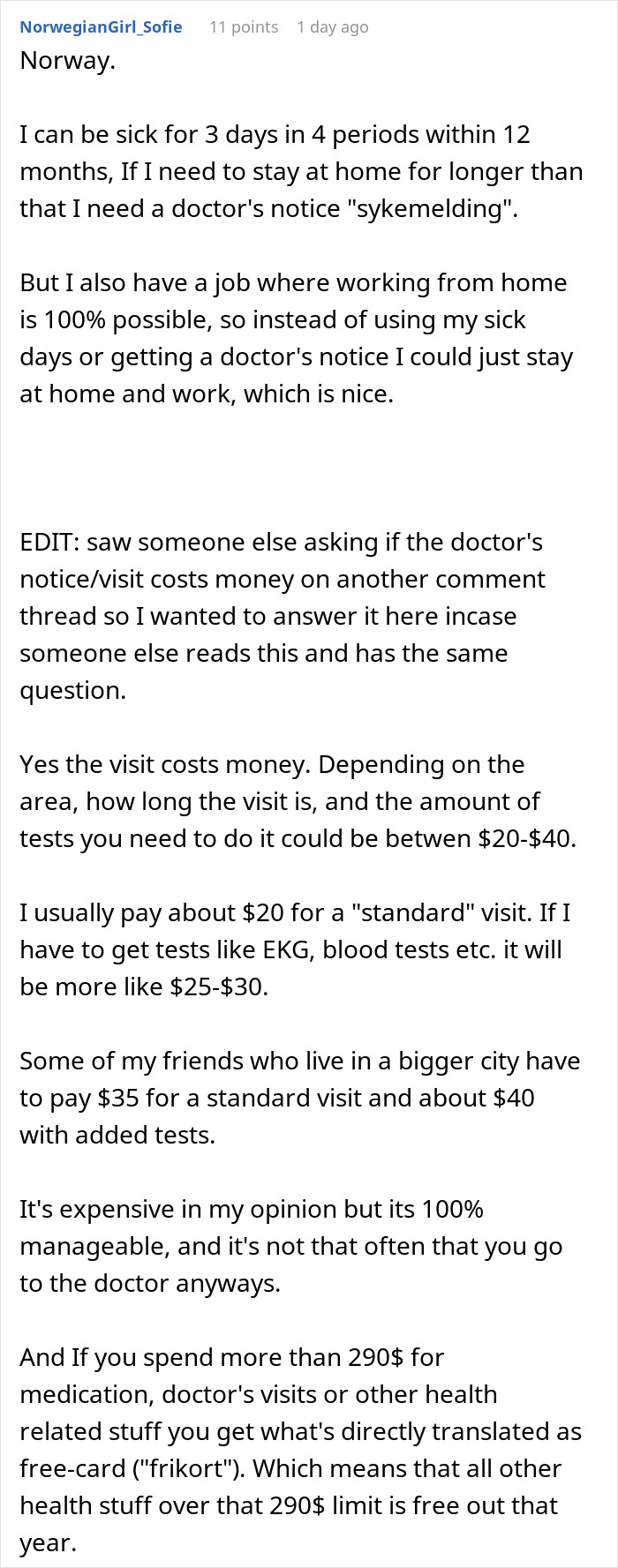
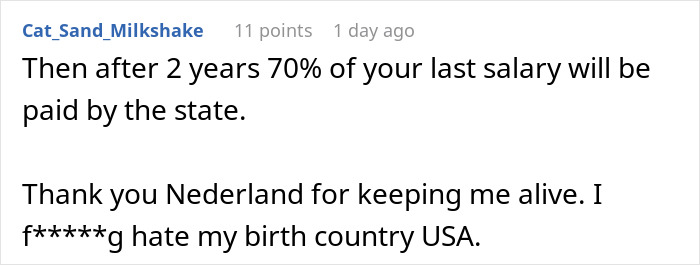


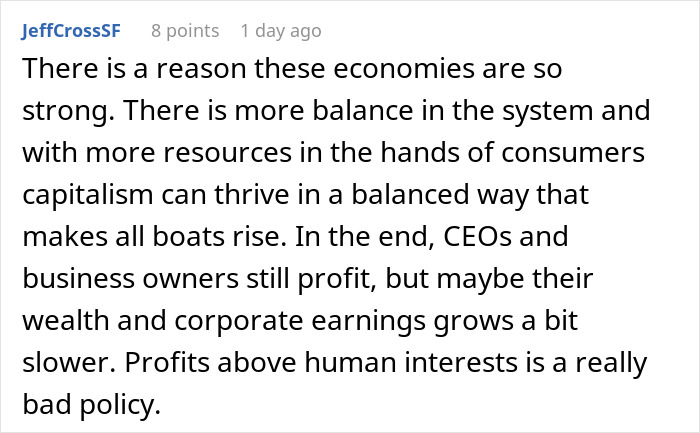




108
61